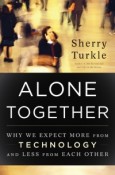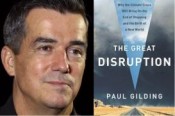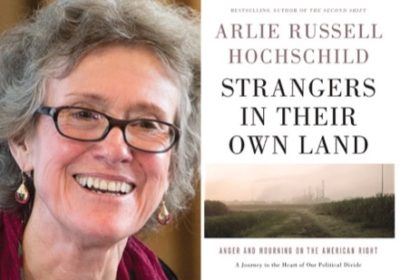- Q&A: ARLIE HOCHSCHILD, Strangers in Their Own Land: Anger & Mourning on the American Right. What new story can make Americans yearn for the future more than the past?
Free Forum: A World That Just Might Work – 03-13-2018
Terrence McNally interviews Arlie Hochschild, sociology professor emerita, UC Berkeley, author, Strangers in Their Own Land
McNally:
Okay. Hello, I’m Terrence McNally and welcome to Free Forum: A World That Just Might Work.Soon after the 2016 election, I discovered this quote from Antoine de Saint-Exupery, who’s most famous for writing The Little Prince. Here’s the quote. “If you want to build a ship, don’t drum up the men to gather wood, divide the work and give orders. Instead, teach them to yearn for the vast and endless sea.”
My question is, how do we do that in 2018? That day, a bit over a year ago, I wrote the following: “Passion to return to a simpler past drove enough voters to the polls in swing states to decide the 2016 presidential election. How can we engage their emotions in a more positive forward-looking or progressive direction? When you offer people the preservation of the present, or the return to the past, when you offer to postpone or eliminate change, as Trump does, your audience has an experience to draw from. And for many, an inflated or idealized vision of the past has a clear advantage over the yet-to-be-experienced future, the uncertainty of that future.
Can we generate a vision of a future that is as welcome, compelling, inviting and real as the past some so fondly remember? Let’s start with the following questions. What is a compelling narrative that can drive Americans to yearn for a future richer than the past they want to come back? What vision could we offer to engage their emotions, because clearly, emotions are at play here, that will fuel their yearning rather than feed their fear? And who can do this, and who should do this, and who is doing this?”
Ever since that day, I’ve been wanting to talk with today’s guest, Arlie Hochschild, professor emerita of sociology at UC Berkeley, and author most recently of Strangers in Their Own Land: Anger and Mourning on the American Right.
For over 30 years, her inventive and provocative and useful insights about contemporary work and family have grown out of research. She’s done the interviews, she’s spent time with the people, and she has long focused on the human emotions which underlie our moral beliefs, practices and social lives.
Known as the founder of the sociology of emotion, she’s the author of several books including Second Shift, The Time Bind and The Outsourced Self. At the core of her most recent book, Strangers in Their Own Land, is the power of a story. After five years talking with folks in southern Louisiana, Hochschild sensed that a particular deep story they share is what holds their political contradictions together. I want to hear more about the power of that narrative and ask what she thinks is possible in terms of coming up with another narrative, a narrative that offers an inviting and inclusive future. I imagine she will say, “Start by listening.”
Welcome, Arlie Hochschild. You laughed and said that, in fact, that would be your first advice, wouldn’t it?
Hochschild:
I think it would, I think it would. And to not be frightened to sit down and respectfully listen to people that you know going in are going to be different from you in their outlook, their premises.But, to pick up the challenge you just posed… After you’ve listened, what kind of a vision could one put forward. The people I came to know in researching Strangers in Their Own Land over five years in the center of the petrochemical industry in Louisiana, very right wing, everybody went for Trump, I got the feeling that they would be very interested in a vision which, for one thing, is unifying.
Continue reading → - Q&A: SHERRY TURKLE, Psychologist & Author – ALONE TOGETHER

Aired 02/13/11
How much technology do you use? Email, texting, facebook, twitter, second life, etc. How's it working for you? Has it freed you up, given you more time, or has it added new demands to your life that actually make you feel you have less time? If you're using social media regularly, do you feel more connected with your friends and family or less?
Clinical psychologist SHERRY TURKLE has been studying our relationship with technology for most of her career, and has written several books about what she's experienced and learned. Of her newest, ALONE TOGETHER, she has said, "This is a book of repentance. I have been studying computers and people for thirty years. I didn't see several important things. I got some important things wrong." I was already interested in talking to her, but that really grabbed my attention. I'm interested in people, maybe especially experts, who are willing to change their minds.
Turkle writes: "Technology promises to let us do anything from anywhere with anyone. But it also drains us as we try to do everything everywhere. We begin to feel overwhelmed and depleted by the lives technology makes possible. We may be free to work from anywhere, but we are also prone to being lonely everywhere. In a surprising twist, relentless connection leads to a new solitude. We turn to new technology to fill the void,but as technology ramps up, our emotional lives ramp down."
http://www.alonetogetherbook.com/Continue reading → - System Failure: We Are Approaching the End of Society As We Know It — And That May Be a Good Thing

Paul Gilding says it’s time to stop worrying about climate change; global crisis is no longer avoidable. He believes the Great Disruption started in 2008, as spiking food and oil prices signaled the end of Economic Growth 1.0 based on consumption and waste. Coming decades will see loss, suffering and conflict, but he believes the crisis offers us both an unmatched business opportunity as old industries collapse to be replaced by new ones, and a chance to replace our addiction to growth with an ethic of sustainability.
Gilding has been involved with activist campaigns on a wide variety of issues and served as executive director of Greenpeace Australia and Greenpeace International. He founded Ecos Corporation in 1995, consulting to some of the world’s largest corporations on issues of sustainability until its sale in 2008. Gilding’s first book is The Great Disruption: Why the Climate Crisis Will Bring on the End of Shopping and the Birth of a New World.
Terrence McNally: Could you briefly talk about your path to the work you do today?
Paul Gilding: I started as an activist really very young. Age 14, 15, I got involved in a variety of issues and went on from there through 19 years of traditional activism, more on the human social side than the environmental side. Then through the late ’70s to early ’80s, I got involved in the anti-nuclear weapons and nuclear war movement. That led to a greater understanding of environmental issues, which then led to Greenpeace and very focused direct-action campaigns against corporate pollution. I ended up head of Greenpeace International.
I left there in the mid ’90s, focused on the role of markets and companies. How could we mobilize the power of markets as a force for good in this area? For the next 15 years I focused on that question, working in the corporate sector, running two companies that I built. Really trying to see if you can drive change through business — from the point of view of self-interest, recognizing that business is driven by making money. That’s their core metric.
Then about four or five years ago, I came to the conclusion that we really had done our best in the environmental and social change movements, but the ecological and system pressures we’d brought to bear on the global ecosystem were now in full flight. Change is going to be unstoppable.
Continue reading → - Can Computer Games Save Us All? New Research Shows How Gaming Can Help Cure Our Social Ills

February 21, 2012
Tech futurist and game designer Jane McGonigle on how computer games can help the fight against AIDS, heal disabilities, increase optimism, and make us better people.
There are 183 million active computer game players in the United States. The average young person will spend 10,000 hours gaming by the age of 21. More than 5 million “extreme” gamers in the U.S. play an average of 45 hours a week. Videogames took in about $15.5 billion last year.
Most of what you hear about this phenomenon is doom and gloom – people becoming addicted, isolated and socially inept. Some worry that gaming is pulling people away from productive work, fulfilling relationships and real life. But game designer Jane McGonigal says the reason for the mass exodus to virtual worlds is that videogames are increasingly fulfilling genuine human needs. In a very popular TED talk — and in her first book, Reality Is Broken, just out in paperback – she suggests we can use the lessons of game design to fix what is wrong with the real world.
Jane McGonigal is the director of Game R&D at the Institute for the Future and creative director of Social Chocolate. BusinessWeek called her “one of the ten most important innovators to watch.” Oprah magazine thinks she’s “one of the twenty most inspiring women in the world.” And MIT Technology Review named her “one of top 35 innovators changing the world through technology.”
Terrence McNally interviewed McGonigal for AlterNet by phone from her home in the San Francisco Bay Area.
Terrence McNally: I see four strands in what I’ve read about you and your work: Buddhism, games, positive psychology, and entrepreneurism. How do you describe your path?
Jane McGonigal: That’s a pretty good breakdown, I like it. I think, first and foremost, I try to help people unleash their real-life superpowers to bring out the best in them so they achieve epic wins lead extraordinary lives, and be of extraord
Continue reading → - Economic Armageddon: Gretchen Morgensen on How Wall Street Broke the Economy
NYT business reporter Gretchen Morgensen discusses her new book and the corruption of the mortgage lending industry.
July 26, 2011 | Gretchen Morgensen was awarded the Pulitzer Prize in 2002 for her “trenchant and incisive” coverage of Wall Street and has been on that beat ever since. Her new book, Reckless Endangerment: How Outsized Ambition, Greed, and Corruption Led to Economic Armageddon (written with Joshua Rosner), lays out the toxic interplay between Washington, Wall Street and corrupt mortgage lenders that led to the meltdown. It examines how the watchdogs who were supposed to protect us from financial harm were actually complicit in creating the crisis.
Gretchen Morgenson is a business reporter and columnist at the New York Times, where she also serves as assistant business and financial editor. Prior to joining the Times in 1998, she worked as a broker at Dean Witter in the 1980s, and as a reporter at Forbes, Worth, and Money magazines.
Continue reading → - Good Without God: Why “Non-Religious” Is the Fastest-Growing Preference in America
Authors Phil Goldberg and Greg Epstein share their provocative views on why a quarter of Americans now call themselves agnostic, atheist or nonreligious.
May 10, 2011 | Currently more than one billion people around the world define themselves as agnostic, atheist or nonreligious — including 15 percent of Americans. Perhaps more striking, “nonreligious” is not only the fastest growing religious preference in the U.S., but also the only one to increase its percentage in every state over the past generation.
Phil Goldberg and Greg Epstein have provocative perspectives on who these people are, what they believe, and how they arrived at their worldviews and their moral codes.
In February, 1968, the Beatles went to India for an extended stay with their new guru, Maharishi Mahesh Yogi. It may have been the most momentous spiritual retreat since Jesus spent those 40 days in the wilderness.
With these words, interfaith minister Goldberg begins American Veda, his look at India’s impact on Western culture. From Emerson, Thoreau and Whitman, succeeding generations absorbed India’s “science of consciousness,” and millions have come to accept and live by the central teaching of Vedic wisdom: “Truth is One, the wise call it by many names.”
Acccording to Greg Epstein, the humanist chaplain at Harvard University, recent bestsellers from Christopher Hitchens, Richard Dawkins, and Sam Harris stress the irrationality of belief and what’s wrong with religion, while offering few positive alternatives. In Good without God, Epstein explains how humanists strive to live well, build community, uphold ethical values, and lift the human spirit…all without a god. “It’s not enough to just ‘discover’ the meaning of life. Humanism is concerned with one of the most important ethical questions—what we do once we’ve found purpose in life.”
Continue reading → - How You Can Have a Billion-Dollar Income in America and Pay No Taxes
Tax journalist David Cay Johnston explains what’s so rotten about our taxation system and the distribution of wealth in this country.
April 20, 2011 | When I was growing up, people joked about how much they hated taxes, but they paid them, and we had a solid middle-class society. Real wages rose from WWII through 1973.
Today one of our two major political parties — nationally and in state capitals — is unwilling to consider raising taxes no matter the circumstances. Though most of Washington’s officials and media are hysterical about the deficit, and willing to hurt anyone in an effort to reduce it, both parties voted in December to extend tax breaks for the wealthiest Americans for two more years.http://aworldthatjustmightwork.com/wordpress/wp-admin/post.php?post=947&action=edit
Despite profits of $14.2 billion — $5.1 billion from its operations in the United States — General Electric, the nation’s largest corporation, did not have to pay any U.S. taxes last year. Its CEO, Jeffrey Immelt, recently replaced Paul Volcker as leader of President Obama’s Economic Recovery Advisory Board as its name was changed to the Council on Jobs and Competitiveness.
David Cay Johnston worked as an investigative reporter for several newspapers, including the Los Angeles Times from 1976 to 1988, and the New York Times from 1995-2008 where he won a Pulitzer Prize for his innovative coverage of our tax system. He now teaches at Syracuse University College of Law and Whitman School of Management and writes a column at Tax.com. He is the author of two bestsellers, Perfectly Legal and Free Lunch. His next book, The Fine Print, will be published later this year.
Continue reading → - Alone Together: Why We’ve Started Expecting More from Technology and Less from Each Other
Author Sherry Turkle on her new book arguing that relentless connection through technology leads to a new solitude.
March 18, 2011 | “This is a book of repentance,” Sherry Turkle has said of Alone Together: Why We Expect More from Technology and Less from Each Other. “I have been studying computers and people for thirty years. I didn’t see several important things. I got some important things wrong.”
“Technology promises to let us do anything from anywhere with anyone. But it also drains us as we try to do everything everywhere. In a surprising twist, relentless connection leads to a new solitude.”
Sherry Turkle is Professor of the Social Studies of Science and Technology at MIT and founder and director of the MIT Initiative on Technology and Self. A licensed clinical psychologist, Sherry is the author of several books including The Second Self: Computers and the Human Spirit, and Life on the Screen: Identity in the Age of the Internet. Alone Together completes a trilogy.
Continue reading → - Why Germany Has It So Good — and Why America Is Going Down the Drain
Germans have six weeks of federally mandated vacation, free university tuition, and nursing care. Why the US pales in comparison.
October 14, 2010 | While the bad news of the Euro crisis makes headlines in the US, we hear next to nothing about a quiet revolution in Europe. The European Union, 27 member nations with a half billion people, has become the largest, wealthiest trading bloc in the world, producing nearly a third of the world’s economy — nearly as large as the US and China combined. Europe has more Fortune 500 companies than either the US, China or Japan.
European nations spend far less than the United States for universal healthcare rated by the World Health Organization as the best in the world, even as U.S. health care is ranked 37th. Europe leads in confronting global climate change with renewable energy technologies, creating hundreds of thousands of new jobs in the process. Europe is twice as energy efficient as the US and their ecological “footprint” (the amount of the earth’s capacity that a population consumes) is about half that of the United States for the same standard of living.
Unemployment in the US is widespread and becoming chronic, but when Americans have jobs, we work much longer hours than our peers in Europe. Before the recession, Americans were working 1,804 hours per year versus 1,436 hours for Germans — the equivalent of nine extra 40-hour weeks per year.
In his new book, Were You Born on the Wrong Continent?, Thomas Geoghegan makes a strong case that European social democracies — particularly Germany — have some lessons and models that might make life a lot more livable. Germans have six weeks of federally mandated vacation, free university tuition, and nursing care. But you’ve heard the arguments for years about how those wussy Europeans can’t compete in a global economy. You’ve heard that so many times, you might believe it. But like so many things, the media repeats endlessly, it’s just not true.
According to Geoghegan, “Since 2003, it’s not China but Germany, that colossus of European socialism, that has either led the world in export sales or at least been tied for first. Even as we in the United States fall more deeply into the clutches of our foreign creditors — China foremost among them — Germany has somehow managed to create a high-wage, unionized economy without shipping all its jobs abroad or creating a massive trade deficit, or any trade deficit at all. And even as the Germans outsell the United States, they manage to take six weeks of vacation every year. They’re beating us with one hand tied behind their back.”
Thomas Geoghegan, a graduate of Harvard and Harvard Law School, is a labor lawyer with Despres, Schwartz and Geoghegan in Chicago. He has been a staff writer and contributing writer to The New Republic, and his work has appeared in many other journals. Geoghagen ran unsuccessfully in the Democratic Congressional primary to succeed Rahm Emanuel, and is the author of six books including Whose Side Are You on, The Secret Lives of Citizens, and, most recently, Were You Born on the Wrong Continent?
Continue reading → - America’s Empire and Endless Wars Are Destroying the World, and Ruining Our Great Country
For more than 50 years, Washington has subscribed to the absurd notion that America can police the world with military action. All we’ve managed to do is bankrupt our country.
September 6, 2010 | Andrew Bacevich speaks with a fairly unique mix of experience, authority, passion and wisdom in questioning our nation’s priorities: specifically our willingness to place so much of our national identity, wealth, attention, moral practice, and finally the life and blood of many thousands of our citizens and millions of those of other countries in the hands of our military. A professor of history and international relations at Boston University, Bacevich served twenty-three years in the U.S. Army, retiring with the rank of colonel. He lost his son in Iraq. A graduate of the U. S. Military Academy, he received his Ph. D. in American Diplomatic History from Princeton University. He is the author of several books, including The New American Militarism; The Limits of Power: The End of American Exceptionalism; and his newest, Washington Rules: America’s Path to Permanent War
Skip to content

